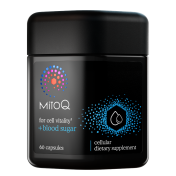Blood sugar
Blood sugar levels respond not only to the food you consume but also to other factors such as stress and physical activities. Blood sugar, or blood glucose, is the amount of glucose present in the blood at a specific moment. A healthy body is capable of maintaining a stable blood sugar level. This is achieved in part by the production of the hormone insulin in the pancreas when there is an excess of glucose in the blood, causing blood sugar levels to be too high. When blood sugar levels are too low, your pancreas produces the hormone glucagon. In this way, insulin is the hormone that lowers blood sugar levels, and glucagon is the hormone that raises blood sugar levels.
What Is Blood Sugar Level?
We all know that it's not good to consume too much sugar because it's important to keep the blood glucose level as constant as possible. For some people, such as those with diabetes, it's necessary to regulate blood sugar levels with medication. But what exactly happens in our bodies in the sugar metabolism? When we consume food, carbohydrates - consisting of sugars and starch - in our food are broken down into glucose. This glucose enters the blood from the intestines and is then sent to the body's cells by the hormone insulin, where glucose serves as fuel for energy. When more glucose enters than the body can burn, the excess is stored in the muscles and liver in the form of glycogen. These locations have space to store energy for about one day. Anything that doesn't fit there is converted into fat.
What Are the Symptoms of Low Blood Sugar Level?
A low blood sugar level is called hypoglycemia. You may experience trembling, sweating, yawning, palpitations, or dizziness. The cause is too little sugar in your blood, for example, due to not eating carbohydrates for too long. Intense exercise, fasting, and eating late can also lower your blood sugar level.
What Raises Blood Sugar Level?
When blood sugar levels are too low, the pancreas produces the hormone glucagon, which converts glycogen from the muscles back into glucose. Your blood sugar level rises when you consume fast carbohydrates and sugars. This is food with a high glycemic index (GI). A too high blood sugar level is called hyperglycemia. If no or few carbohydrates are ingested, for example, on a low-carb diet or during fasting, the body will switch to burning fats. In extreme cases, the body can even convert proteins into glucose and use them as fuel.
Role of the Pancreas
The pancreas is a key player in maintaining a healthy blood sugar level and a healthy digestive system. The pancreas contains groups of cells known as the islets of Langerhans, named after their discoverer, the German pathologist Langerhans (1847-1888). These islets can be divided into alpha cells, which produce the hormone glucagon, and beta cells, which produce the hormone insulin. Through the production of these hormones, the islets of Langerhans play a crucial role in carbohydrate metabolism and in maintaining the body's sugar balance.
Taking Care of Your Pancreas
You can support your pancreas by getting enough exercise and following a healthy eating pattern. It's important that your diet is not deficient and keeps your blood sugar levels as stable as possible. Lean proteins and dairy products, vegetables, fruits, and whole grains are often recommended, while fried foods, sugar, trans fats, and alcohol are discouraged. In particular, peas, cinnamon, and foods rich in protective polyphenols (think garlic, onions, nuts, seeds, rosemary, basil, green tea, apples, walnuts, and citrus fruits) help keep your pancreas healthy. It is also possible to support the pancreas with supplements. For example, Ergomax offers the Suprefort® Pancreatic Extract from Garmonia, a pancreatic enzyme supplement that contains a potent peptide complex specifically for the pancreas.








